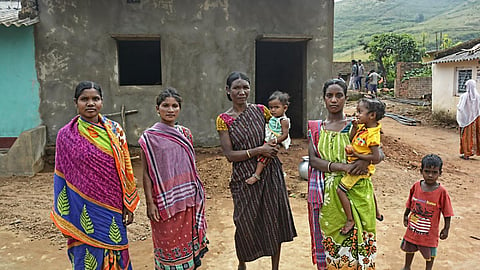
- Topics
- Feature
- Opportunities & Events
- About
- Hindi Portal
- Data
- Topics
- Feature
- Opportunities & Events
- About
- Hindi Portal
- Data

According to the United Nations and Oxford Poverty and Human Development Initiative (OPHI), the economic fallout owing to coronavirus could push at least 260 million people in the country into poverty. As the virus continues to spread in the country, the three Multidimensional Poverty Index (MPI) indicators-- sharing a household with a person who is malnourished, lack of safe drinking water and clean cooking fuel-- are also Covid-19 risk factors. Moreover, the pandemic will also raise concerns of malnutrition among vulnerable Indians due to income losses in view of nationwide lockdown and disruptions in food supply chains. However, the government has announced a more than Rs 1.70-lakh crore package to alleviate poverty hit by economic disruption due to the coronavirus outbreak. (Huffpost, News18)
The cyclonic storm Amphan over the southeast Bay of Bengal has intensified into a severe cyclonic storm and is expected to make a landfall today between East Midnapore’s coastal belt of Digha in West Bengal and Hatiya islands in Bangladesh with gale winds of 150-160 kmph, gusting to 180 kmph during the landfall. The storm has already caused heavy rains in many parts of Kerala and widespread damage in Kottayam district. To tackle the super cyclone, West Bengal government has evacuated about three lakh people from its coastal areas, while Odisha also prepares for the cyclone by deploying rapid action forces and identifying cyclone shelter homes. (Times Now, Livemint, NDTV)
The Water and Power Development Authority (WAPDA) of Pakistan has signed an agreement with the Power Construction Corporation of China and the Frontier Works Organisation (FWO), a construction firm of the Pakistan Army, to build the main dam of the Diamer Bhasha hydroelectric project and an access bridge. Along with this, the award also covers the construction of the 21 MW Tangir Hydro-Electric plant, which has been envisaged to power the construction of the main 4500 MW Diamer-Bhasha project at a later stage. The Diamer Bhasha dam is coming up in the disputed Gilgit-Baltistan region and India has reacted sharply, saying building projects in territories under Pakistan's illegal occupation is 'not proper'. (Deccan Herald, The Print)
As per a study conducted by the Central Soil Salinity Research Institute (CSSRI), Karnal, Haryana, it has been revealed that to save groundwater for future generations there is a need to break the traditional wheat-paddy cycle. Along with recommending radical changes in the agricultural use of available water, the researchers have also also advised the farmers to adopt root zone irrigation (RZI) over flood irrigation to save the groundwater. It has also been advised to replace both wheat and paddy with maize as it consumes 50 percent less water, but there is a need for assured marketing of maize like wheat and paddy to divert farmers. (Hindustan Times)
Following the incident of styrene leak from LG polymers plant in Visakhapatnam, there were fears of water contamination of Meghadri Gedda reservoir owing to the leakage. However, in a major relief, the officials from the water supply management department of the Greater Visakhapatnam Municipal Corporation have confirmed that water in the reservoir is safe. The water samples from the reservoir were collected on four consecutive days and the result showed that the water has not been contaminated by the gas. The city environmentalists were worried that considering the general wind velocity of Visakhapatnam, such a gas leak incident could have had an adverse effect on areas in the vicinity. (The Times of India)
This is a roundup of important news published between May 11 - 18, 2020. Also read policy matters this week.